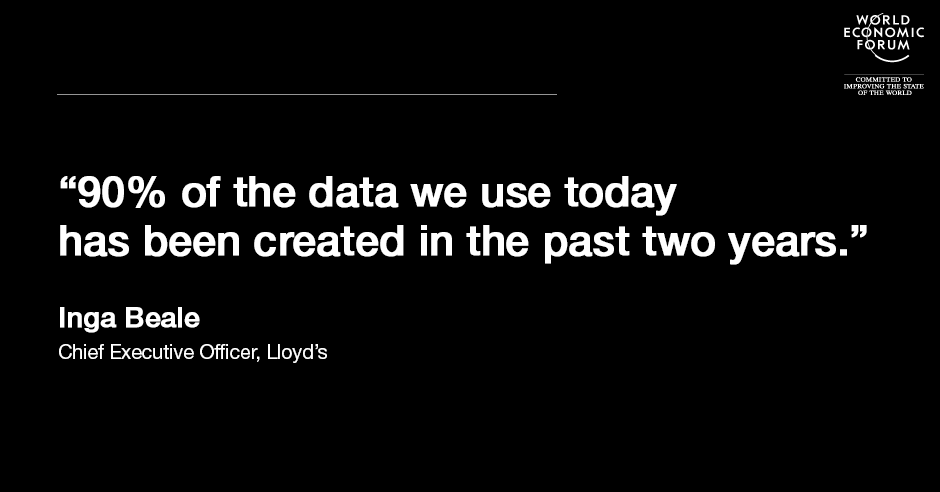How to survive and thrive in the fintech revolution

The time to move on fintech is yesterday, says Lloyd's CEO Inga Beale. Image: REUTERS/Amir Cohen

Get involved with our crowdsourced digital platform to deliver impact at scale
Stay up to date:
Davos Agenda
You might be reading this on a train. You might be reading this on a plane. You might be reading this – no not in an automobile – as you rush to a meeting. But most likely you are reading this on a smart device. Whether you like it or not we are now at a point where we depend on these ultra-portable, always-connected technologies. So much so that they have profoundly affected the way we live, socialise, and work.
Every week we hear about a new technology that will transform our lives. Just as often, we hear about new innovations that will transform industries.
And we’ve all heard about fintech. The saviour of global financial services. The revolutionary force upending everything we know. Or perhaps the innovation threatening to disrupt and disintermediate us all.
So how do the world’s financial services - the engines of the global economy – deal with this disruptive force?
Three words. Engage. Embrace. Evolve.
Engage. The time to move on fintech is yesterday. Five years ago it was the fringe of alternative platforms, such as peer–to-peer lending, crowdfunding and mobile currencies in places like Kenya and Korea.
Now it is being deployed by mainstream financial institutions to tackle central tasks of critical strategic importance. Take Blockchain (the technology behind Bitcoin) for example. It may offer a radically more efficient and secure way to create and maintain ledgers – the core of all financial systems and has been slated as a game changer for 2016.

It’s fuelled by the explosion of data – 90% of the data we use today has been created in the past two years. Big data analytics is already being applied to capital markets, security, customer insight, channel marketing, and providing new data sets for risk pricing and tracking. The International Data Corporation (IDC) expects the market for big data technology and services to grow at an annual rate of 23%, reaching $48.6 billion in 2019. This will be driven by wide adoption across industries. Ignore this revolution and you are toast.
Embrace. Find the best-of-breed start-ups and partner with them. It will be quicker than building it in-house and better value than acquiring businesses, plus you’ll retain the firecracker talent and culture that make ambitious tech businesses fly. You’ll also ensure you’ve got room to move if a better tech solution comes by – and it probably will.
It’s not about start-up banks vs big banks or about traditional investment vs crowdfunding. It is about how the established players with market access best adopt new, fintech solutions. No tech start-up entrant will find it easy to gain global market coverage, or the long-running experience required to fully disrupt the big financial service players. What they can do is fix the parts of our process that aren’t working, and enable us to enter new markets, create new products, and develop new ways of analysing, pricing and tracking risk.
Evolve. Imagine the world in 2025. It will be completely digital. Everything and everywhere will be connected. Imagine your company in this digitally dependent world. Imagine your industry. Can you? If that is impossible, you are in deep water. If you can and it excites you, you are on the right track.
Evolution isn’t about throwing away the decades of experience and the wisdom that has got you this far. It is a process of change that enhances and builds upon the strong foundation and skills you already have. It isn’t admitting you are doing it wrong, it is recognising that innovation is creating opportunities undreamt of 20 years ago. For CEOs in the financial services sector, it is an exciting time.
Recently I took a short journey out to London’s Tech City – the hub of tech innovation in the UK. What I noticed was the unconventional, vibrant approach they had. It wasn’t just colourful offices filled with bean bags, slides and Stars Wars memorabilia. It was the energy and excitement to create change for the better. To make history - and some of them are.
Just like them, we have the opportunity to make history. To ensure that this disruptive force we call fintech becomes our inspiration for the future.
Author: Inga Beale, Chief Executive Officer, Lloyd’s. She is participating in the World Economic Forum’s Annual Meeting in Davos.
Don't miss any update on this topic
Create a free account and access your personalized content collection with our latest publications and analyses.
License and Republishing
World Economic Forum articles may be republished in accordance with the Creative Commons Attribution-NonCommercial-NoDerivatives 4.0 International Public License, and in accordance with our Terms of Use.
The views expressed in this article are those of the author alone and not the World Economic Forum.
The Agenda Weekly
A weekly update of the most important issues driving the global agenda
You can unsubscribe at any time using the link in our emails. For more details, review our privacy policy.
More on Davos AgendaSee all
Kate Whiting
April 17, 2024
Andrea Willige
March 27, 2024
Shyam Bishen
March 20, 2024
Simon Torkington
March 15, 2024
Miranda Barker
March 7, 2024





